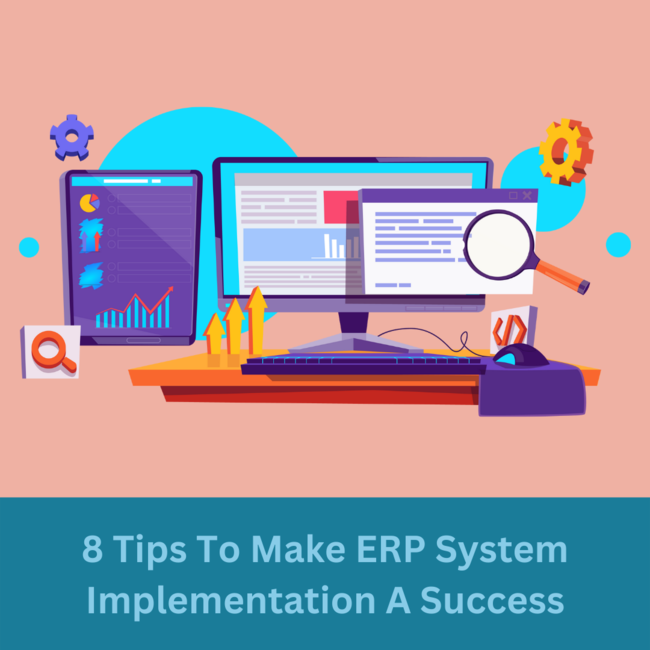8 Tips For Seamless ERP System Integration

Introducing new software into your habitual business operations entails lots of changes which you and your employees need to adapt to. However, no changes means no growth. In this blog, we discover 8 tips that will ensure seamless ERP system implementation.
8 Tips To Make ERP Software Implementation A Success
Determine your goals
ERP comes with multiple functionalities. However, you need to clearly understand what you want to achieve with the help of a specific software before buying it. If inventory, accounting and customer relationships are the most vunerable areas of your business, make sure the software you plan on buying includes these functionalities.
Your employees know all the particulars of the everyday operations so taking into account their opinion is also important. Speak to your employees to get their insight on what could be improved in their workflow and consider this information when browsing various ERP solutions.
This is where a custom ERP solution comes in handy. The ability to customize its functionalities is what sets custom ERP apart from off-the-shelf systems. The major benefit of custom ERP is that you get to use software that is built exactly to your business requirements. Meanwhile, a ready-made ERP is built to tackle generic business problems across various industries.
Find a dependable software provider
Finding the right software provider is no less important than finding the software itself. Different providers work with different clients, meaning they have expertise in different areas. If you are a manufacturer, it is better to go with a provider that has experience in building manufacturing-specific ERP systems. They have a general idea of what manufacturing businesses require when it comes to ERP.
For over two decades, Toronto-based custom software development company Vestra Inet has been trusted by industrial and commercial clients for its quality and efficient ERP software. We listen closely to our client's requirements and develop software according to the needs of our clients. Unlike the off-the-shelf software, we build systems that mirror all processes of your business ensuring an unmatched level of efficiency.
Assign a team to manage the transition process
While you may be tempted to control the entire implementation process, it’s not always a good idea to try and grasp everything at once. Designate a team within your company and assign specific tasks. With a hierarchy like that, it will be easier for you to track the implementation process.
Facilitate data migration
Data is the core of your business, so data migration should be taken seriously when implementing ERP software. Sort through all your data to eliminate unnecessary information and ensure only the value-bearing information is transferred into the new ERP system.
Adjust the system to align with your existing business processes
The success and the length of this step widely depend on your software provider. Discuss the timelines with your provider long before signing the contract. It is important that your provider can balance between being detail-oriented and quick when it comes to implementing the new system.
Test the system
Testing is important in any business as this is when any shortcomings are detected before the system is launched. Test your system to make sure it works flawlessly. Once testing is successful, your software can go live.
Train your employees
Your employees are the first who will be interacting with the new software on a daily basis, so you need to make sure their experience is as smooth as possible. Conduct training sessions, ask for feedback, make sure your employees feel comfortable using the newly implemented product.
Launch the new system
Once your new ERP system is live, you can start utilizing it to its full capacity. However, this doesn’t mean that this is where implementation ends. ERP implementation is a continuous process that requires monitoring and refinement from time to time. Your business is evolving, and so do the processes within it. Thus, you need to make sure the ERP system is aligned with the ever-changing business requirements.
Is ERP worth the investment?
ERP is the go-to tool if you are looking to streamline your business processes and achieve better performance for your workforce. It’s a great tool that will help you enhance your productivity, efficiency, collaboration, and communication between the departments in your business. You will never go wrong if you decide to implement an ERP into your business operations. It may take time before you start seeing results. However, when you do see the software in action you won’t regret the money invested into it.
